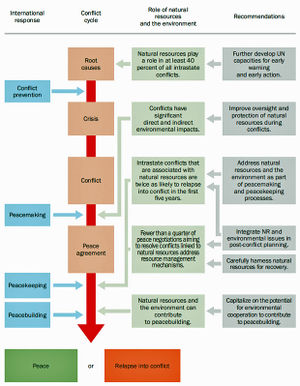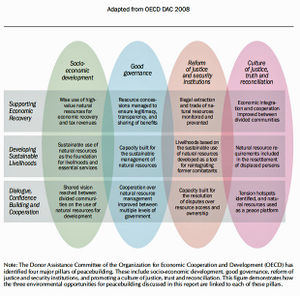From Conflict to Peacebuilding: Conclusions and policy recommendations
Three main conclusions can be drawn from the arguments and cases presented in this report:
a) Natural resources and the environment can be implicated in all phases of the conflict cycle, contributing to the outbreak and perpetuation of violence and undermining prospects for peace. In post-conflict countries, they can also contribute to conflict relapse if they are not properly managed from the outset. The way that natural resources and the environment are managed has a determining influence on peace and security.
b) The environment can itself fall victim to conflict, as direct and indirect environmental damage, coupled with the collapse of institutions, can lead to environmental risks that threaten health, livelihoods and security. These risks should be addressed as a part of the recovery process.
c) Natural resources and the environment can contribute to peacebuilding through economic development, employment generation and sustainable livelihoods. Cooperation over the management of natural resources and the environment provides new opportunities for peacebuilding that should also be pursued.
As a result, UNEP’s Expert Advisory Group on Environment, Conflict and Peacebuilding recommends that the UN Peacebuilding Commission and the wider international community consider the following six areas for priority action:
1. Further develop UN capacities for early warning and early action
The UN system needs to strengthen its capacity to deliver early warning and early action in countries that are vulnerable to conflicts over natural resources and environmental issues. At the same time, the effective governance of natural resources and the environment should be viewed as an investment in conflict prevention within the development process itself:
- Prioritize capacity-building for dispute resolution, environmental governance and land administration in states that are vulnerable to conflicts over natural resources and the environment.
- Include environmental and natural resource issues in international and regional conflict early warning systems and develop expertise for preventive action.
- Build international capacity to conduct mediation between conflicting parties where tensions over resources are rising.
- Support research on how the impacts of climate change could increase vulnerability to conflict and how early warning and adaptation projects could address this issue.
- Ensure that all development planning processes are conflict-sensitive and consider potential risks from the mismanagement of natural resources and the environment.
2. Improve oversight and protection of natural resources during conflicts
The international community needs to increase oversight of “high-value” resources in international trade in order to minimize the potential for these resources to finance conflict. International sanctions should be the primary instrument dedicated to stopping the trade in conflict resources and the Security Council should require Member States to act against sanctions violators. At the same time, new legal instruments are required to protect natural resources and environmental services during violent conflict:
- Develop international certification mechanisms to ensure that natural resources can be tracked more effectively.
- A high-level report by the Secretary-General examining the UN’s experience in addressing the role of natural resources in conflict and peacebuilding, recommending ways in which existing UN approaches may be strengthened, and clarifying what constitutes a “conflict resource,” would help improve coordination, increase oversight and provide a basis for the identification of cases that require action by the Security Council.
- Make secondary sanctions systematic and uniform, so that individuals and companies violating sanctions are subject to criminal prosecution, no matter which state they are based in.
- Support and strengthen current processes to develop new international legal instruments against targeting natural resources and ecosystems during conflicts.
3. Address natural resources and the environment as part of the peacemaking and peacekeeping process
During peace mediation processes, wealth-sharing is one of the fundamental issues that can “make or break” a peace agreement. In most cases, this includes the sharing of natural resources, including minerals, timber, land and water (Water resources). It is therefore critical that parties to a peace mediation process are given sufficient technical information and training to make informed decisions on the distribution and sustainable use of natural resources. Subsequent peacekeeping operations need to be aligned with national efforts to improve natural resource and environmental governance:
- Strengthen UN capacity to provide technical information on the status of natural resources and the environment, and to make recommendations for sustainable use during mediation processes.
- Ensure that there are processes in place within peace agreements for the transparent, equitable and legitimate definition and realization of property rights and resource revenues and tenure.
- Mandate UN peacekeeping operations, where appropriate, to monitor natural resource extraction and management, or certain environmental issues that have the potential to re-ignite conflict or finance rebel groups. In particular, the UN should make efforts, in conjunction with regional organizations and states, to prohibit smuggled resources from being exported from sanctioned countries and to prevent the trade in conflict resources.
4. Integrate natural resource and environmental issues into post-conflict planning
The UN often undertakes post-conflict operations with little or no prior knowledge of what natural resources exist in the affected country, or of what role they may have played in fueling conflict. In many cases it is years into an intervention before the management of natural resources receives sufficient attention. A failure to respond to the environmental and natural resource needs of the population, including the gender dimension of resource use, can complicate the task of fostering peace and even contribute to conflict relapse:
- Ensure that a conflict analysis is conducted at the operational planning stage of what natural resources exist in the country, the role that they may have played in fueling conflict, and the potential risks they pose to the peace process if they are mismanaged or poorly governed. This conflict analysis should directly inform the wider post-conflict needs assessment process.
- Systematically conduct post-conflict environmental assessments that identify environmental risks to human health, livelihoods and security and prioritize needs in the short and medium term.
- Consider environmental sustainability when planning relief and recovery operations, so as to make sure that the projects are not contributing to the risk of future conflict.
- Integrated peacebuilding strategies should include a selection of environmental and natural resource indicators to monitor the peacebuilding trajectory and any potential destabilizing trends.
5. Carefully harness natural resources for economic recovery
Natural resources can only help strengthen the postwar economy and contribute to economic recovery if they are managed well. The international community should be prepared to help national authorities manage the extraction process and revenues in ways that do not increase risk of further conflict, or are unsustainable in the longer term. This must go hand in hand with ensuring accountability, transparency and environmental sustainability in their management:
- Prioritze weaknesses in natural resource and environmental governance structures for capacitybuilding when these may contribute to a conflict relapse or human insecurity.
- UN bodies should help assess the legitimacy and fairness of existing concession agreements, as inequitable contracts may themselves become a source of conflict. UN agencies or international financial institutions could also provide technical assistance to public officials to help negotiate equitable concessions and contracts on natural resources.
- International organizations should promote the transparent management of revenues from natural resource extraction. Where applicable, efforts should be made from an early stage to bring the country into compliance with international standards of revenue transparency and trade controls such as the Extractive Industries Transparency Initiative, the Kimberley Process, and the Forest Law Enforcement, Governance and Trade initiative.
- At the national level, independent monitoring bodies should be established to carry out regular inspections of logging, mining and other forms of resource extraction.
- Gather lessons learned on best and worst practices in terms of natural resource and environmental management in conflict-affected countries, with a view to developing a database, guidance materials and training for UN Country Teams and peacekeeping operations.
- More systematic efforts are needed by the UN and national governments to engage the private sector in the development of policies on natural resources and the environment.
6. Capitalize on the potential for environmental cooperation to contribute to peacebuilding
Every state needs to both use and protect vital natural resources such as forests, water (Water resources), fertile land, energy and biodiversity. Environmental issues can thus serve as an effective platform or catalyst for enhancing dialogue, building confidence, exploiting shared interests and broadening cooperation between divided groups, as well as between states:
- At the outset of peacebuilding processes, identify locations or potential “hotspots” where natural resources may create tension between groups, as well as opportunities for environmental cooperation to complement and reinforce peacebuilding efforts.
- Conversely, make dialogue and confidence-building between divided communities an integral part of environmental projects, so that peacebuilding opportunities are not missed.
- Include environmental rights in national constitutional processes as a potential connecting line between diverging interests.
- Build on existing community-based systems and traditions of natural resource management as potential sources for post-conflict peacebuilding, while working to ensure that they are broadly inclusive of different social groups and interests.
| Disclaimer: This article is taken wholly from, or contains information that was originally published by, the United Nations Environment Programme. Topic editors and authors for the Encyclopedia of Earth may have edited its content or added new information. The use of information from the United Nations Environment Programme should not be construed as support for or endorsement by that organization for any new information added by EoE personnel, or for any editing of the original content. |
| This is a chapter from From Conflict to Peacebuilding: The Role of Natural Resources and the Environment (report). Previous: The role of natural resources and environment in peacebuilding|Table of Contents|Next: Annex I: Acronyms |

